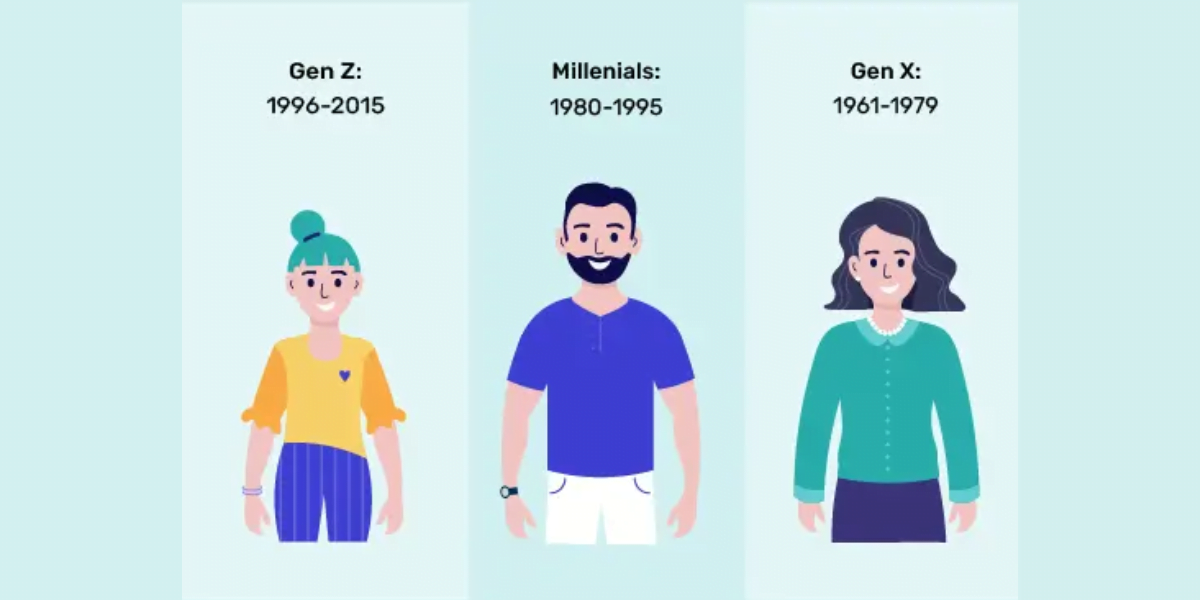Societal norms are significantly influenced by generational cohorts, which are defined by birth year ranges and shared characteristics. These generations also reflect the behaviors and adaptability to the technology of the society.
Generation Z and Millennials are about to be exposed in terms of their defining traits, online behaviors, as well as year-by-year breakdowns. The emergent Generation Alpha will also be revealed in this article.
Millennials (1981-1996)
Characteristics: Millennials, also known as Generation Y, grew up during the transition from analog to digital technology. They witnessed the rise of the internet, social media, and mobile technology, which deeply influenced their communication habits and worldview.
- Technology Adoption: Early adopters of social media platforms like Facebook, Twitter, and Instagram.
- Education: Highly educated, valuing experiences over material possessions.
- Work Preferences: Favor flexible working conditions and value work-life balance.
- Social Concerns: Environmentally conscious, socially liberal, and culturally diverse.
Online Behaviors:
- Social Media Use: Extensive use of social media for networking, news, and entertainment.
- E-commerce: Frequent online shoppers, preferring reviews and recommendations before purchasing.
- Content Consumption: Enjoy streaming services like Netflix and Spotify; favor podcasts and long-form articles.
Generation Z (1997-2012)
Characteristics:Generation Z, or Zoomers, are true digital natives. Born into a world of smartphones and high-speed internet, they have a natural affinity for technology and instant communication.
- Technology Adoption: Heavy users of mobile devices and apps like TikTok, Snapchat, and Instagram.
- Education: Practical and career-oriented, with a preference for hands-on learning experiences.
- Work Preferences: Seek job security, entrepreneurial opportunities, and work environments that align with their values.
- Social Concerns: Social justice, diversity, and mental health awareness advocates.
Online Behaviors:
- E-commerce: Inclined towards sustainable brands and personalized shopping experiences.
- Content Consumption: Short-form videos, memes, and interactive content like stories and live streams are highly popular.
- Social Media Influence: Platforms like Instagram, TikTok, and Snapchat have shaped their social interactions and perceptions of reality.
Generation Alpha (2013-2025)
Characteristics: Generation Alpha is the first cohort entirely born in the 21st century. They are growing up in a world dominated by artificial intelligence, automation, and advanced digital ecosystems.
- Technology Adoption: Early and immersive interaction with technology, including voice assistants, smart devices, and educational apps.
- Education: Learning in digitally enriched environments with an emphasis on STEM (Science, Technology, Engineering, Mathematics).
- Work Preferences: Expected to prioritize innovative workspaces and tech-driven careers.
- Social Concerns: Likely to be influenced by the environmental and social values of Millennials and Gen Z.
Online Behaviors:
- Social Media Use: Likely to engage with emerging platforms and immersive technologies such as AR (Augmented Reality) and VR (Virtual Reality).
- E-commerce: Will grow up with advanced e-commerce ecosystems, expecting seamless and instant shopping experiences.
- Content Consumption: Preference for interactive, gamified learning and entertainment content.
Year-by-Year Breakdown
Millennials (1981-1996)
- 1981-1985: Early Millennials experienced the analog era, transitioning to digital in adolescence.
- 1986-1990: Witnessed the rise of personal computers and early internet adoption.
- 1991-1996: Grew up with the explosion of the internet, social media, and mobile phones.
Generation Z (1997-2012)
- 1997-2001: Early Gen Zers saw the mainstreaming of mobile technology and social media.
- 2002-2006: Grew up with smartphones, high-speed internet, and the rise of YouTube.
- 2007-2012: Came of age with apps, streaming services, and on-demand content.
Generation Alpha (2013-2025)
- 2013-2017: Early Alphas are experiencing technology integration in early childhood education.
- 2018-2022: Growing up with AI assistants, smart home devices, and interactive learning tools.
- 2024-2025: Will enter school systems and social environments shaped by advanced digital and AI technologies.
Conclusion
It is by delving into generational traits and the way Millennials, Gen Z, and Generation Alpha interact online that we glean precious pearls of knowledge about how technology, education and social dynamics are metamorphosing. Every generation has its own contribution of perspectives and skills which makes the future take shape in various unorthodox forms. We are yet to fully appreciate what these generations have done for us; the impact they will keep making on how we use technology and relate with others— but it certainly means saying goodbye to boring mono-dimensional worlds, doesn’t it?
Disclaimer: Our website name stands Get Youth for Basically, we focus on Scholarships, Visa Guide,Jobs, Internship, and Guideline, etc. Getyouth.org is not related to any government body. We are not affiliated with any government body or corporation. Our purpose is solely to provide news coverage and updates across various topics.













